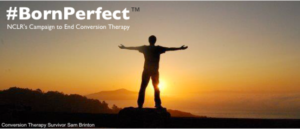Like thousands of other young people who risk their lives in search of refuge from abuse in their home countries, Marco made the perilous journey to the United States with strangers and only the clothes on his back. He was 15 and. as a gay youth, had already endured several years of physical and emotional abuse at the hands of family, schoolmates and neighbors in Honduras. A sensitive child with an artistic streak and absolutely no interest in sports or roughhousing with other boys, Marco had been teased, taunted and physically attacked for not being “man enough.” His grandmother was unable to protect him from the abuse and eventually agreed to let him go to the U.S. to live with an uncle.
 Unfortunately, Marco’s living situation in Los Angeles didn’t turn out to be the respite he expected from the tumult he had left behind in Honduras. Marco’s uncle forced Marco to work late hours as a dishwasher, causing his school attendance and performance to suffer, and the uncle became increasingly intolerant of Marco’s sexual orientation and “too feminine” expression. He became verbally abusive and on one occasion slapped Marco as he yelled at him to “change his ways.”
Unfortunately, Marco’s living situation in Los Angeles didn’t turn out to be the respite he expected from the tumult he had left behind in Honduras. Marco’s uncle forced Marco to work late hours as a dishwasher, causing his school attendance and performance to suffer, and the uncle became increasingly intolerant of Marco’s sexual orientation and “too feminine” expression. He became verbally abusive and on one occasion slapped Marco as he yelled at him to “change his ways.”
Despite feelings of depression resulting from the multiple traumas he’d experienced, Marco entered foster care somewhat hopeful that he would at last be able to live safely as his authentic self. However, his journey in the child welfare system began as quite the disappointment, as Marco’s foster mother, though warm, was clearly on a mission to try to change Marco’s sexual orientation and gender expression. The foster mother criticized Marco for his choice in clothing and insisted he trade in his fitted pants and t-shirts for what she deemed to be clothing “more suitable for boys.” She enlisted her older son to give Marco “lessons” on how to walk and sit in a more masculine manner. She took Marco to her church, where the pastor counseled Marco on how to be a “godly man,” encouraging traditional gender roles and heterosexual dating. These messages were not lost on Marco: become straight and gender conforming if you want to be acceptable to God and your foster family. And so, despite deep misgivings, that is exactly what Marco tried to do.
Few practices hurt lesbian, gay, bisexual and transgender (LGBT) youth like Marco more than attempts to change their sexual orientation, gender identity or expression. Young people experience these “conversion therapy” efforts as rejection and, as a result, suffer from depression and attempt suicide at rates six and eight times higher, respectively, than their peers who experience little or no rejection by their families. They also are more than three times more likely than their peers to engage in substance abuse and sexual behavior that put them at risk for HIV and other sexually transmitted diseases.
The American Psychological Association has warned that being subjected to conversion therapy can result in a whole host of ills, including depression, social withdrawal, substance abuse, intimate relationship issues, risky sexual behavior and suicide. And every major medical and mental health association in the country has declared the practices ineffective, unnecessary and potentially harmful.
However, despite this complete disavowal by the medical community, many young people continue to be subjected to these discredited and dangerous practices. According to a Williams Institute (UCLA) report released earlier this year, 20,000 LGBT youth (ages 13-17) will receive conversion therapy from a licensed mental health provider before they reach the age of 18 and another 57,000 from a religious leader. Children in state custody are not immune to this reality. In fact, they are vulnerable to being subjected to these efforts by multiple sources, such as social workers, mental health providers, foster parents, relative caregivers or placement staff.
Child welfare agencies, which are charged with ensuring the safety and wellbeing of youth, can protect youth from these harmful practices through policies that explicitly state that agency representatives—including employees and foster parents—cannot engage in any efforts to change the sexual orientation or gender identity of youth in their care, and that the agency cannot contract with providers who engage in such efforts. Several jurisdictions have adopted these types of policies and have coupled them with training, including information on the harms of conversion therapy and the appropriate therapeutic responses to LGBT youth.
 The National Center for Lesbian Rights (NCLR) has been standing up for conversion therapy survivors for more than 20 years. In 2014, NCLR launched the Born Perfect campaign to end conversion therapy throughout the United States. To date, we have helped secure legislation protecting young people from these dangerous practices at the hands of licensed mental health professionals in 10 states, the District of Columbia and 35 municipalities. This year, three additional state legislatures have passed bills that are awaiting signature by their respective governors.
The National Center for Lesbian Rights (NCLR) has been standing up for conversion therapy survivors for more than 20 years. In 2014, NCLR launched the Born Perfect campaign to end conversion therapy throughout the United States. To date, we have helped secure legislation protecting young people from these dangerous practices at the hands of licensed mental health professionals in 10 states, the District of Columbia and 35 municipalities. This year, three additional state legislatures have passed bills that are awaiting signature by their respective governors.
But the legislative work, though the most visible, is only one of several strategies used by the campaign to protect LGBT youth from conversion therapy. Acknowledging the particular vulnerabilities of youth in state care, we have been assisting child welfare—and juvenile justice—agencies to develop policies protecting youth in care from being subjected to practices aimed at changing their sexual orientation or gender identity. Those interested in learning more, including how to receive technical assistance, can contact Carolyn Reyes, Youth Policy Counsel and Born Perfect Campaign Coordinator, at CReyes@NCLRights.org.
—
Carolyn Reyes is the youth policy counsel and Born Perfect campaign coordinator at the National Center for Lesbian Rights.